The time for spring planting has arrived.
While designing and implementing your flower beds consider adding drought tolerant plants to your landscape.
These types of plants require less time, in regards to water and fertilizer, and benefit nature’s pollinators. Learn more in 3 Reasons to Include Native Plants in Your Landscape.
No one wants to spend their landscaping budget on flowers that will simply wilt away with the summer heat. And no one wants to spend their summer sweating in the yard and attempting to keep their plants alive.
Protect your investment of both money and time by adding our top 7 low maintenance plants to your landscape.
Coreopsis
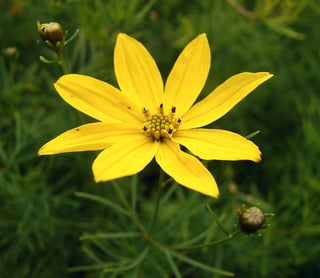 Coreopsis is known for its yellow, daisy-like flowers that bloom in June. This perennial can reach 1.5 – 2 feet in height and 1.5 – 2 feet in width and should be used as a border or part of a more natural garden.
Coreopsis is known for its yellow, daisy-like flowers that bloom in June. This perennial can reach 1.5 – 2 feet in height and 1.5 – 2 feet in width and should be used as a border or part of a more natural garden.
Water Requirements: Low
Sun Requirements: Plant in the Full Sun
Benefits: Butterflies benefits from Coreopsis but these perennials are also tolerant of deer, drought and dry soil.
Crape Myrtle
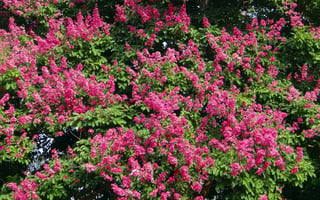 Crape Myrtles are known for their colorful and long-lasting flowers that bloom July – September. This shrub, or small tree, can reach between 6 and 25 feet in height and 6 to 20 feet in width.
Crape Myrtles are known for their colorful and long-lasting flowers that bloom July – September. This shrub, or small tree, can reach between 6 and 25 feet in height and 6 to 20 feet in width.
Water Requirements: Medium
Sun Requirements: Plant in the Full Sun
Benefits: Crape Myrtles are tolerant of air pollution and drought.
Learn more about crape myrtles in How To Care For Crape Myrtles.
Indian-Hawthorn
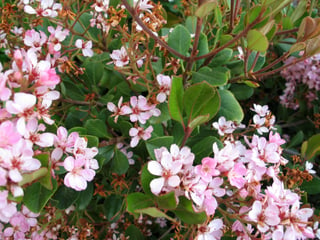 Indian-hawthorns are known for their white to light-pink flowers that begin blooming in April and/or May. Use this evergreen as a hedge or shrub as it can reach 4 – 6 feet in height and 4 -6 feet in width.
Indian-hawthorns are known for their white to light-pink flowers that begin blooming in April and/or May. Use this evergreen as a hedge or shrub as it can reach 4 – 6 feet in height and 4 -6 feet in width.
Water Requirements: Medium
Sun Requirements: Plant in the Full Sun
Benefits: Birds benefit from Indian-hawthorns
Loropetalum
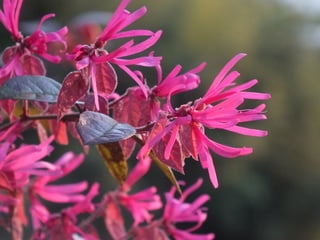 Loropetalums are known for their purplish leaves that begin blooming in March and/or April. Use this evergreen as a border, hedge or screen as it can reach 6 – 10 feet in height and 6 – 10 feet in width.
Loropetalums are known for their purplish leaves that begin blooming in March and/or April. Use this evergreen as a border, hedge or screen as it can reach 6 – 10 feet in height and 6 – 10 feet in width.
Water Requirements: Medium
Sun Requirements: Plant in the Full Sun to Part Shade
Rosemary
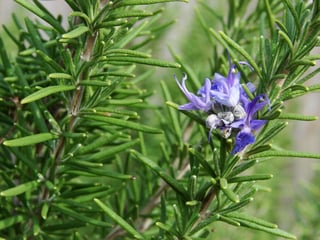 Rosemary is known for its needle-like leaves and pale blue flowers that begin blooming in June and/or July. Use this perennial as a border, hedge or in containers on your patio but keep in mind that they can reach 2 – 6 feet in height and 2 – 4 feet in width.
Rosemary is known for its needle-like leaves and pale blue flowers that begin blooming in June and/or July. Use this perennial as a border, hedge or in containers on your patio but keep in mind that they can reach 2 – 6 feet in height and 2 – 4 feet in width.
Water Requirements: Low to Medium
Sun Requirements: Plant in the Full Sun
Benefits: Butterflies benefits from Rosemary but these perennials are also tolerant of deer and drought.
Stonecrop
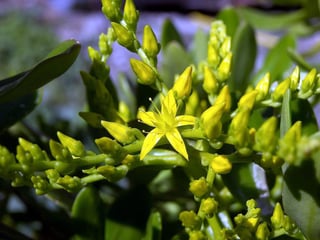 Stonecrop is known for its pointed grayish-green leaves and yellow blooms that bloom in June. Use this perennial as a ground cover as it can reach .25 - .5 feet in height and 1 – 2 feet in width.
Stonecrop is known for its pointed grayish-green leaves and yellow blooms that bloom in June. Use this perennial as a ground cover as it can reach .25 - .5 feet in height and 1 – 2 feet in width.
Water Requirements: Low to Medium
Sun Requirements: Plant in the Full Sun
Benefits: Stonecrop can tolerate air pollution, deer, drought, dry soil and rabbits.
Yarrow
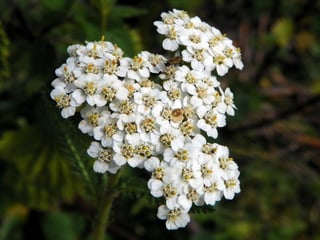 Yarrows are known for their small white flowers that appear to be flattened. They bloom in the heat of June and can reach 2 – 4 feet in height and 2 – 3 feet in width. Use this perennial as a cover or as a part of a more natural garden.
Yarrows are known for their small white flowers that appear to be flattened. They bloom in the heat of June and can reach 2 – 4 feet in height and 2 – 3 feet in width. Use this perennial as a cover or as a part of a more natural garden.
Water Requirements: Low to Medium
Sun Requirements: Plant in the Full Sun
Benefits: Butterflies benefit from Yarrows but these perennials are also tolerant of air pollution, deer, drought and dry soil.
No one wants to plant their flower beds this spring just to have to work extra hard to keep them alive and well this summer. Invest in drought tolerant plants now to save on additional maintenance later.


